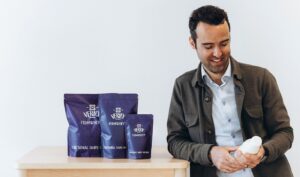For many consumers, one of the first things they look for when buying a range of different food products is the existence of artificial colors, flavours and preservatives. In Europe, the prevalence of so-called ‘E numbers’ — the name ascribed to the collection artificial food additives by the European Food Safety Authority — was soon discovered in many foods and consumers across the continent started to be on the lookout.
Another additive, aspartame, known for its use in some diet sodas, was later revealed to be a neurotoxin and carcinogen, so for some consumers, finding food products with natural additives became a daily struggle.
Fast forward to today, and there are many products that use natural additives for color, flavor and preservation. But this doesn’t tell the whole picture, according to Joanne Zhang, founder of Phytoption, a biotechnology company which is making high value, insoluble ingredients soluble for use in food, supplements, cosmetics, and pharmaceuticals.
“There are many natural ingredients used today that are hardly functional on their own,” she tells AgFunderNews. “Beta-Carotene, for example, a natural colour found in carrots, doesn’t dissolve on its own which makes it hard to see the color unless food manufacturers use a system to dissolve it. This often means using a lot of solvents, so you are adding a lot of artificial ingredients to the natural ingredients, which defeats the purpose!”
Phytoptian has been working on solving this problem with Purdue University since 2011 and has created a platform to solubilize various ingredients used in food and drink, and in cosmetics and drugs such as antioxidants and anti-cancer drugs.
By solubilizing ingredients, the company is making these ingredients more effective, from improving taste and appearance to improving their nutritional qualities.
“Some natural extracts are good for us and have therapeutic qualities, which can prevent disease. If we can utilize them more effectively, we can make food more functional,” she said. This ability to improve the qualities and efficiency of certain ingredients plays right into the growing consumer trend for more nutritional, healthier and natural food, she argued. And so the company is already doing trials with a range of Fortune 500 companies in the food sector, as well as in the cosmetics and drugs industries, where the solubilizing technology can also have benefits.
Phytoption has received a range of government grants for its research and recently won the BioCrossroads New Venture Competition, winning $25,000 and beating five other startups to the top prize. BioCrossroads is a public-private collaboration to support Indiana’s life sciences sector.
As well as the cash prize, Phytoption will also have access to the staff of the Indiana Seed Fund II, the early stage life science fund, and its network of resources, to help with business planning and strategic support. And it will have the opportunity to present to the fund’s investment committee.
Over the past three years, the competition has awarded more than $180,000 to 12 start-up companies, which have secured over $7 million in follow-on funding, according to a press release.
Winning the competition and gaining access to the Indiana Seed Fund will stand Phytoption in good stead as it embarks on a $1 million seed capital fundraising round to set up a manufacturing facility in Indiana. The company is hoping to start producing products for sale by the second half of 2016.
Have news or tips? Email [email protected]





